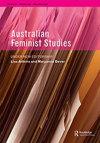詹皮沙漠编织者与土著生存艺术
IF 1.5
4区 社会学
Q2 WOMENS STUDIES
引用次数: 0
摘要
摘要这篇文章是关于Tjanpi沙漠编织者的最新艺术,这是Ngaanyatjarra、Pitjantjatjara和Yankunytjatjera(NPY)妇女委员会的非营利社会企业,作为生态-身体女权主义土著“生存”的实践。Kuka Irititja(另一个时代的动物)和Tjituru-Tjituru(悲剧、悲伤和悲伤)与非土著艺术家Fiona·霍尔合作创作,重点关注死亡、灭绝和毁灭。谁的生命,谁的死亡在过去很重要;他们的生命和死亡在今天都很重要。这些作品引用了20世纪50年代英国在艺术家们的沙漠家园马拉林加测试核弹的故事,并探索了在无情的定居者殖民破坏之后的生活,正如蕾妮·瓦努尼·库利贾在谈到她为特吉图鲁·特吉图鲁创作的作品时所说:“这些是为那些出生但从未生活过的人准备的”。本文对这些作品进行了仔细的分析,并将其置于被占领的偏远先锋派或原住民艺术的更广泛框架中,探讨了这些作品如何解决当今阿南古/亚南古女性尚未过去的过去,以及Tjanpi Desert Weavers艺术作品在当今的重要意义。本文章由计算机程序翻译,如有差异,请以英文原文为准。
Tjanpi Desert Weavers and the Art of Indigenous Survivance
ABSTRACT This article is about recent art of Tjanpi Desert Weavers, the not-for-profit, social enterprise of the Ngaanyatjarra, Pitjantjatjara and Yankunytjatjara (NPY) Women’s Council, as practices of eco-somatic feminist Indigenous ‘survivance’. Kuka Irititja (animals from another time) and Tjituru-tjituru (Tragedy, Grief and Sadness), produced in creative collaboration with non-Indigenous artist Fiona Hall, focus on death, extinction, annihilation. Whose lives, whose deaths mattered in the past; whose lives, whose deaths matter today. These works reference the British testing of nuclear bombs at Maralinga in the desert homelands of the artists in the 1950s and explore living-on in the aftermath of relentless settler colonial devastation, as Rene Wanuny Kulitja says of her work for Tjituru-tjituru: ‘these are for the ones who were born but never lived’. Developing a close analysis of the works, situated in a broader framework of remote avantgarde or Aboriginal art under occupation, this article explores how these works address a past that is not past for Anangu/Yarnangu women today and the vital importance of the work of Tjanpi Desert Weavers art production in the present.
求助全文
通过发布文献求助,成功后即可免费获取论文全文。
去求助
来源期刊

Australian Feminist Studies
WOMENS STUDIES-
CiteScore
2.50
自引率
0.00%
发文量
7
期刊介绍:
Australian Feminist Studies was launched in the summer of 1985 by the Research Centre for Women"s Studies at the University of Adelaide. During the subsequent two decades it has become a leading journal of feminist studies. As an international, peer-reviewed journal, Australian Feminist Studies is proud to sustain a clear political commitment to feminist teaching, research and scholarship. The journal publishes articles of the highest calibre from all around the world, that contribute to current developments and issues across a spectrum of feminisms.
 求助内容:
求助内容: 应助结果提醒方式:
应助结果提醒方式:


